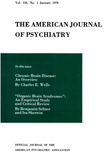INTERCHANGEABILITY OF ANTIPARKINSONIAN MEDICATION
Abstract
In this study, conducted on 30 mental hospital patients manifesting extrapyramidal symptomatology, two antiparkinsonian drugs were interchanged with one another and with a placebo in a double-blind, crossover trial, and the results compared with a third antiparkinsonian drug used as a positive control. Physical and laboratory information was collected as well as ratings on psychiatric and extrapyramidal symptomatology.
In all subgroups, the extrapyramidal symptom ratings were significantly higher (p>.005) when receiving placebo than when receiving promethazine, ethopropazine or trihexyphenidyl. This would indicate the effectiveness of these drugs in controlling extrapyramidal symptomatology as well as the inadequacy of placebo treatment in cases of overt extrapyramidal symptomatology.
There were no significant changes in physical and laboratory measures, nor in ratings of psychiatric symptoms under any of the experimental conditions.
Access content
To read the fulltext, please use one of the options below to sign in or purchase access.- Personal login
- Institutional Login
- Sign in via OpenAthens
- Register for access
-
Please login/register if you wish to pair your device and check access availability.
Not a subscriber?
PsychiatryOnline subscription options offer access to the DSM-5 library, books, journals, CME, and patient resources. This all-in-one virtual library provides psychiatrists and mental health professionals with key resources for diagnosis, treatment, research, and professional development.
Need more help? PsychiatryOnline Customer Service may be reached by emailing [email protected] or by calling 800-368-5777 (in the U.S.) or 703-907-7322 (outside the U.S.).



